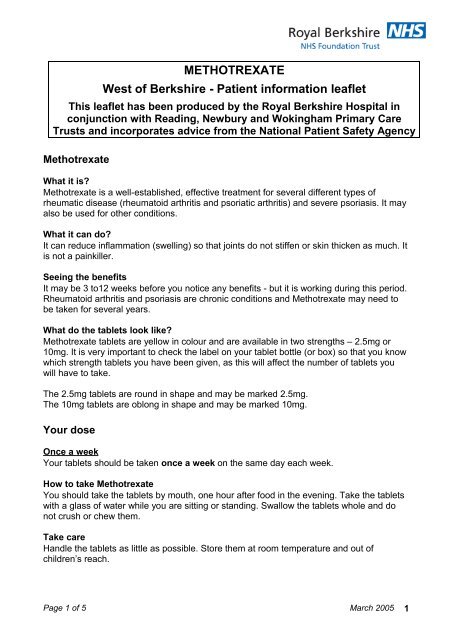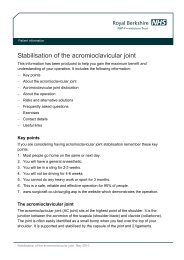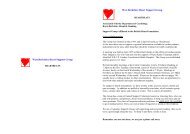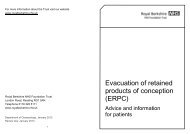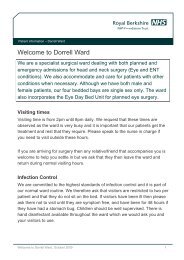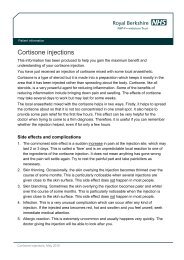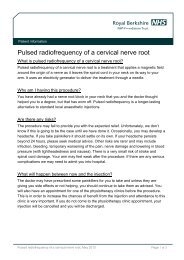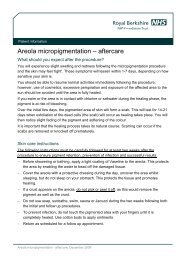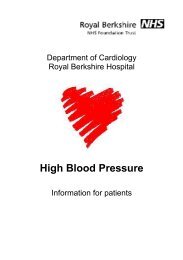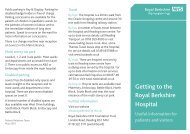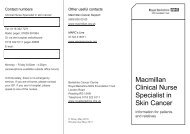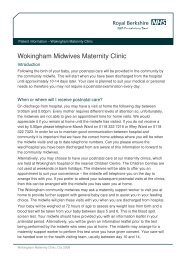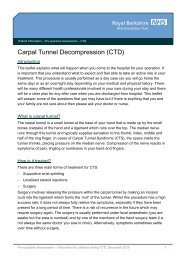METHOTREXATE West of Berkshire - Patient information leaflet
METHOTREXATE West of Berkshire - Patient information leaflet
METHOTREXATE West of Berkshire - Patient information leaflet
You also want an ePaper? Increase the reach of your titles
YUMPU automatically turns print PDFs into web optimized ePapers that Google loves.
<strong>METHOTREXATE</strong><br />
<strong>West</strong> <strong>of</strong> <strong>Berkshire</strong> - <strong>Patient</strong> <strong>information</strong> <strong>leaflet</strong><br />
This <strong>leaflet</strong> has been produced by the Royal <strong>Berkshire</strong> Hospital in<br />
conjunction with Reading, Newbury and Wokingham Primary Care<br />
Trusts and incorporates advice from the National <strong>Patient</strong> Safety Agency<br />
Methotrexate<br />
What it is?<br />
Methotrexate is a well-established, effective treatment for several different types <strong>of</strong><br />
rheumatic disease (rheumatoid arthritis and psoriatic arthritis) and severe psoriasis. It may<br />
also be used for other conditions.<br />
What it can do?<br />
It can reduce inflammation (swelling) so that joints do not stiffen or skin thicken as much. It<br />
is not a painkiller.<br />
Seeing the benefits<br />
It may be 3 to12 weeks before you notice any benefits - but it is working during this period.<br />
Rheumatoid arthritis and psoriasis are chronic conditions and Methotrexate may need to<br />
be taken for several years.<br />
What do the tablets look like?<br />
Methotrexate tablets are yellow in colour and are available in two strengths – 2.5mg or<br />
10mg. It is very important to check the label on your tablet bottle (or box) so that you know<br />
which strength tablets you have been given, as this will affect the number <strong>of</strong> tablets you<br />
will have to take.<br />
The 2.5mg tablets are round in shape and may be marked 2.5mg.<br />
The 10mg tablets are oblong in shape and may be marked 10mg.<br />
Your dose<br />
Once a week<br />
Your tablets should be taken once a week on the same day each week.<br />
How to take Methotrexate<br />
You should take the tablets by mouth, one hour after food in the evening. Take the tablets<br />
with a glass <strong>of</strong> water while you are sitting or standing. Swallow the tablets whole and do<br />
not crush or chew them.<br />
Take care<br />
Handle the tablets as little as possible. Store them at room temperature and out <strong>of</strong><br />
children’s reach.<br />
Page 1 <strong>of</strong> 5 March 2005 1
What to do if you miss a dose<br />
Do not double up on the next dose. Continue taking the tablets as directed, but make a<br />
note <strong>of</strong> it on your card and remember to tell your Doctor at your next visit.<br />
If you are sick<br />
If you are sick within a few hours <strong>of</strong> taking Methotrexate tell your GP. You may be told to<br />
take another dose or to wait until the next dose is due the following week.<br />
<strong>Patient</strong>s who are regularly sick after every dose may be given Methotrexate by injection<br />
instead.<br />
Depending upon how well the tablets work for you, the dose you need to take may change.<br />
If your dose changes, the number <strong>of</strong> tablets you should take may change. But you will still<br />
only need to take them once a week.<br />
Do not take the tablets if you think you have the wrong strength. Check with your doctor or<br />
pharmacist as soon as possible.<br />
Why you need regular blood tests<br />
It is important that you do not miss your blood test. You must not take Methotrexate unless<br />
you are having regular blood tests every 4 to 12 weeks. They tell your doctor how well<br />
Methotrexate is working.<br />
Methotrexate reduces the production <strong>of</strong> blood cells and this can make you more vulnerable<br />
to infections. Blood tests will show if you are developing any side effects. If your blood,<br />
liver, kidneys or lungs are being affected, your treatment will be changed or stopped<br />
immediately.<br />
Avoid having blood tests done directly after taking your dose as this can mask any<br />
changes.<br />
When you start taking Methotrexate, your doctor will give you a booklet in which the results<br />
<strong>of</strong> your blood tests must be recorded. This will help you, your doctor and pharmacist know<br />
that the dose is right for you and not adversely affecting your body. Your doctor may<br />
increase or decrease the number <strong>of</strong> tablets you take at each dose depending upon the<br />
results <strong>of</strong> your tests.<br />
Possible side effects<br />
Most people do well on Methotrexate but it can affect your immune system and make you<br />
more vulnerable to illness. Occasionally, it can also produce side effects, some<br />
immediately and some within a few weeks.<br />
Immediate side effects (within 48 hours)<br />
Tell your doctor if these symptoms persist or occur after every dose:<br />
• sickness<br />
• diarrhoea<br />
• skin rashes<br />
Page 2 <strong>of</strong> 5 March 2005 2
Delayed side effects (within 2 to 3 weeks)<br />
• mouth ulcers<br />
• hair loss<br />
Long term side effects (these side effects are rare)<br />
• inflammation <strong>of</strong> the lung - if you become breathless, tell your doctor immediately<br />
• bone marrow damage - your regular blood count test will check how well your bone<br />
marrow is working. Possible indicators <strong>of</strong> bone marrow damage are anaemia, regularly<br />
catching infections, and bruising and bleeding easily<br />
The patient <strong>information</strong> <strong>leaflet</strong> in your tablet packet has a more detailed list <strong>of</strong> possible side<br />
effects.<br />
Some doctors also prescribe folic acid tablets as these can reduce the likelihood <strong>of</strong> side<br />
effects.<br />
Things to tell your doctor immediately<br />
If you have any <strong>of</strong> the following, tell your doctor immediately:<br />
• infections including fever, chills or sore throats<br />
• unexplained skin rash, ulcerations or soreness <strong>of</strong> skin<br />
• yellowing <strong>of</strong> the skin or generalised itching<br />
• bleeding gums, black tarry stools or unexpected bleeding or bruising<br />
• chest pain, difficulty breathing or a dry, persistent cough<br />
• sore mouth or mouth ulcers<br />
• severe and continuing diarrhoea, vomiting or stomach pains<br />
• vaginal inflammation or ulcers<br />
See your doctor if you develop any new symptoms after starting Methotrexate.<br />
Chicken pox and shingles<br />
If you are taking methotrexate and you develop chicken pox or shingles, you should see<br />
your doctor as you may need special treatment.<br />
Other advice<br />
Taking other medicines<br />
Always check with your doctor or pharmacist before taking any other medicine. This<br />
includes medicines you can buy at a garage, newsagent, supermarket or chemist such as<br />
aspirin, paracetamol, other painkillers and medicines for coughs, colds and flu. This<br />
equally applies to herbal and alternative remedies. These can react with Methotrexate and<br />
affect your treatment.<br />
Also, the symptoms you are trying to treat may be a sign <strong>of</strong> Methotrexate not working<br />
safely for you. It is important for your doctor or pharmacist to know so they can help you.<br />
Keep a record <strong>of</strong> any symptoms and discuss them with your doctor.<br />
Page 3 <strong>of</strong> 5 March 2005 3
Drinking alcohol<br />
Alcohol can react with Methotrexate so it is advisable not to drink. However, an occasional<br />
drink may not be expected to cause significant side effects. Your doctor can give you more<br />
<strong>information</strong> and advice about this.<br />
Food<br />
Food made from unpasteurised milk, such as s<strong>of</strong>t cheese and uncooked meats such as<br />
pate, may be a source <strong>of</strong> bacteria which could increase your risk <strong>of</strong> infection. Read food<br />
labels carefully, and avoid eating these types <strong>of</strong> food.<br />
Having a baby<br />
Methotrexate can reduce fertility in men and women. It can also damage an unborn child.<br />
Women<br />
Do not take Methotrexate if you are pregnant or breastfeeding. It is recommended that you<br />
wait six months after finishing your treatment, before trying to become pregnant. You<br />
should talk to your doctor or nurse about effective contraception.<br />
Men<br />
It is recommended that you wait six months after finishing your treatment, before trying to<br />
father a child as your sperm can be affected. You should use effective contraception; talk<br />
to your doctor or nurse if you need advice.<br />
Vaccinations<br />
Your doctor or nurse should not <strong>of</strong>fer you any immunisation injections that have any <strong>of</strong> the<br />
live vaccines such as polio and rubella (German measles). However, flu vaccines are safe.<br />
Other <strong>information</strong><br />
Special arrangements<br />
Your Doctor will arrange for you to have regular blood tests: every 2 weeks for the first 2<br />
months then monthly thereafter. The best time to have your blood test is when the<br />
Methotrexate is “lowest in your system”. So, for example, if you take your Methotrexate on<br />
a Saturday, have your blood test on a Friday.<br />
How long should Methotrexate be continued?<br />
As long as it is effective. The majority <strong>of</strong> people are still taking Methotrexate many years<br />
after they have started treatment. The longest (in <strong>West</strong> <strong>Berkshire</strong>) has been taking it for 15<br />
years, others, like you, have just started taking it.<br />
Responsibilities <strong>of</strong> the patient<br />
It is your responsibility as a patients taking Methotrexate to do the following:<br />
• To report any side effects to the GP, Consultant or Specialist Nurse<br />
• To report any symptoms e.g. Mouth Ulceration easy bruising, bleeding, signs <strong>of</strong><br />
infection – especially sore throats.<br />
• To report breathlessness or cough.<br />
• To have blood tests carried out at agreed intervals<br />
• To avoid excessive alcohol intake<br />
• To report suspected pregnancy.<br />
Page 4 <strong>of</strong> 5 March 2005 4
If your treatment ends and you have some tablets left over, return them to your<br />
pharmacist. Do not flush them down the toilet or throw them away.<br />
When you were given this <strong>leaflet</strong>, you should also have received a booklet for recording<br />
your blood test results. If you did not receive one, ask your hospital clinic for a copy.<br />
Contact <strong>information</strong><br />
NHS Direct Tel: 0845 4647<br />
www.nhsdirect.nhs.uk<br />
NHS Direct Wales Tel: 0845 4647<br />
www.nhsdirect.wales.nhs.uk<br />
Arthritis Care Tel: 020 7380 6500<br />
www.arthritiscare.org.uk<br />
Important notice<br />
This patient <strong>information</strong> <strong>leaflet</strong> has been compiled after consideration <strong>of</strong> the <strong>information</strong> available by the<br />
National <strong>Patient</strong> Safety Agency as at July 2004. It is not intended to be exhaustive and should not be used<br />
as a substitute for consulting your clinician on any particular issue. The National <strong>Patient</strong> Safety Agency<br />
makes no representations, warranties or guarantees as to the accuracy, completeness or adequacy <strong>of</strong> any <strong>of</strong><br />
the content <strong>of</strong> this patient <strong>information</strong> <strong>leaflet</strong> and cannot be held responsible for any liability, loss or damage<br />
whatsoever which may arise from the use <strong>of</strong>, or reliance upon, this patient <strong>information</strong> <strong>leaflet</strong>, except as may<br />
otherwise be required by law.<br />
Reviewed January 2008<br />
Review due: January 2009<br />
Page 5 <strong>of</strong> 5 March 2005 5


